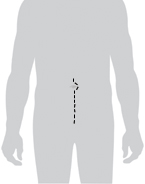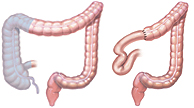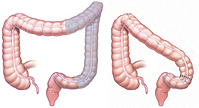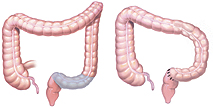Having Open Colon Surgery
During open colon surgery, parts of the colon are surgically removed. You'll be given instructions on how to get ready for your surgery. Follow these instructions carefully. You'll likely be admitted to the hospital on the day of your surgery. In some cases, you may need to be admitted to the hospital the day before. Ask questions if something is unclear.
Getting ready a few weeks before surgery
Here's what you can do to get ready in the weeks before surgery:
-
Have a complete physical exam as instructed by your healthcare provider.
-
Ask about medicines. Tell your surgeon about all the medicines you take, and ask if you should stop taking them before surgery. This includes prescription and over-the-counter medicines, aspirin, and other nonsteroidal anti-inflammatory drugs (NSAIDs), such as ibuprofen. It also includes any vitamins, herbs, or other supplements.
-
Quit smoking. Smoking increases surgery risks and slows healing. Don't smoke on the day of surgery.
-
Exercise. Stay on a program of regular exercise.
Getting ready the day before surgery
Follow any directions you're given for taking medicines and for not eating or drinking before surgery. This includes any instructions you're given for doing bowel prep. Bowel prep is done to clean out the colon before surgery. It usually involves not eating (fasting) for a day. You'll also drink a special liquid that causes you to have bowel movements until the bowel is empty. You'll get specific instructions for this prep. You may be asked to wash with a special soap called CHG (chlorhexidine gluconate).
 |
| The incision may run vertically around your navel. |
The day of surgery
When you arrive at the hospital, you'll be asked to fill out certain forms. You'll then change into a gown. An IV (intravenous) line will be inserted into your hand or arm. This gives you fluids and medicines. You’ll meet with your anesthesiologist or nurse anesthetist to discuss the medicine (anesthesia) that helps you sleep during surgery. Ask any questions you have at this time. Before surgery starts, you’ll be given general anesthesia to put you into a deep sleep. A soft tube (catheter) may be placed into your bladder to drain urine.
During your surgery
Here's what you can expect during surgery:
-
Your surgery will be done through a cut (incision) in your belly. This is called open surgery. The incision may be several inches long. Your surgeon can tell you about the incision you'll have.
-
The problem part of the colon is removed (resected). Sometimes the 2 ends of the colon are joined. This is called an anastomosis.
-
After surgery, you’ll be taken to the PACU (post anesthesia care unit) to be closely watched..
Types of colon resection
The idea of having part of your colon removed may sound scary. But part or all of the colon can be removed without causing serious problems. After the section of bowel is removed, the 2 ends may be reconnected (anastomosis). Below are some of the surgeries that can be done on the colon. The type of surgery depends on where the problem is.
|
 |
| Right hemicolectomy Part or all of the right side (ascending) colon is removed. The remaining colon is then reconnected to the small intestine. |
|
 |
| Left hemicolectomy Part or all of the left side (descending) colon is removed. The remaining colon is then reconnected to the rectum. |
|
 |
| Sigmoid colectomy (sigmoidectomy) Part or all of the sigmoid colon is removed. The descending colon is then reconnected to the rectum. |
|
Other times, the exposed end of the colon or small intestine is sewn to the belly (abdominal) wall through an incision. It will then drain into a special bag outside your body. This is called a colostomy or ileostomy. Your surgeon can discuss this with you at your visit before surgery.
Risks and possible complications
Risks and possible complications of colon surgery include:
-
Infection
-
Injury to nearby organs, such as the kidneys
-
Leaking or separation of anastomosis
-
Scar tissue forms that blocks the bowel (adhesions)
-
Internal bleeding
-
Blood clots
-
A pus-filled infection (abscess) forms
-
Risks of anesthesia
-
The condition comes back
Online Medical Reviewer:
Heather M Trevino BSN RNC
Online Medical Reviewer:
Robyn Zercher FNP
Online Medical Reviewer:
Ronald Karlin MD
Date Last Reviewed:
4/1/2024
© 2000-2024 The StayWell Company, LLC. All rights reserved. This information is not intended as a substitute for professional medical care. Always follow your healthcare professional's instructions.